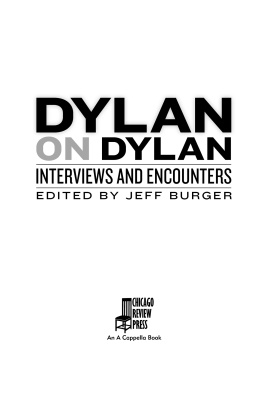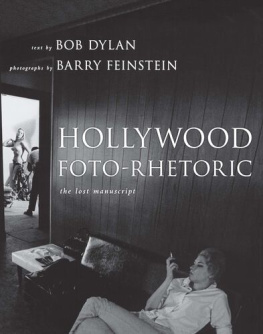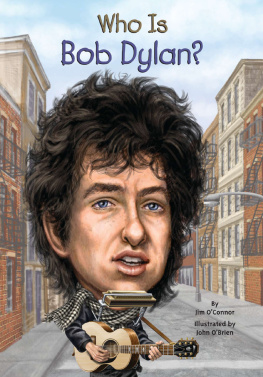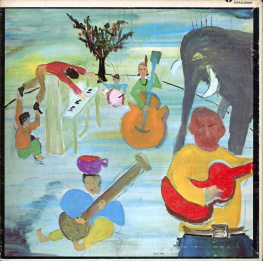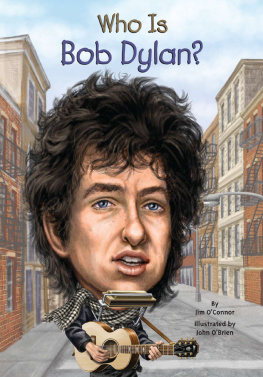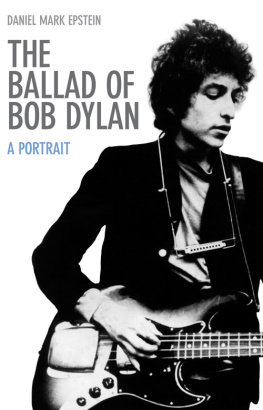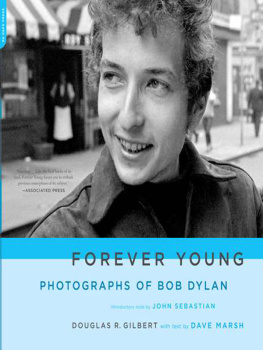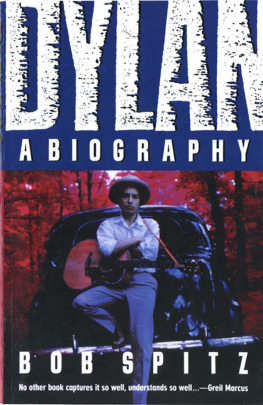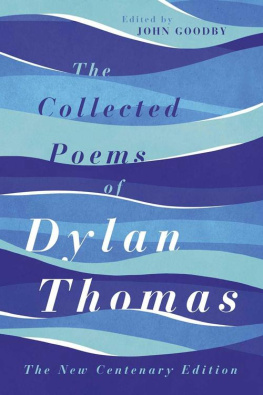Bob Dylan - Dylan on Dylan: Interviews and Encounters
Here you can read online Bob Dylan - Dylan on Dylan: Interviews and Encounters full text of the book (entire story) in english for free. Download pdf and epub, get meaning, cover and reviews about this ebook. year: 2018, publisher: Chicago Review Press, genre: Detective and thriller. Description of the work, (preface) as well as reviews are available. Best literature library LitArk.com created for fans of good reading and offers a wide selection of genres:
Romance novel
Science fiction
Adventure
Detective
Science
History
Home and family
Prose
Art
Politics
Computer
Non-fiction
Religion
Business
Children
Humor
Choose a favorite category and find really read worthwhile books. Enjoy immersion in the world of imagination, feel the emotions of the characters or learn something new for yourself, make an fascinating discovery.
- Book:Dylan on Dylan: Interviews and Encounters
- Author:
- Publisher:Chicago Review Press
- Genre:
- Year:2018
- Rating:4 / 5
- Favourites:Add to favourites
- Your mark:
- 80
- 1
- 2
- 3
- 4
- 5
Dylan on Dylan: Interviews and Encounters: summary, description and annotation
We offer to read an annotation, description, summary or preface (depends on what the author of the book "Dylan on Dylan: Interviews and Encounters" wrote himself). If you haven't found the necessary information about the book — write in the comments, we will try to find it.
Dylan on Dylan: Interviews and Encounters — read online for free the complete book (whole text) full work
Below is the text of the book, divided by pages. System saving the place of the last page read, allows you to conveniently read the book "Dylan on Dylan: Interviews and Encounters" online for free, without having to search again every time where you left off. Put a bookmark, and you can go to the page where you finished reading at any time.
Font size:
Interval:
Bookmark:
Copyright 2018 by Jeff Burger
All rights reserved.
Published by Chicago Review Press Incorporated
814 North Franklin Street
Chicago, Illinois 60610
ISBN 978-0-912777-44-3
Library of Congress Cataloging-In-Publication Data
Are available from the Library of Congress.
A list of credits and copyright notices for the individual pieces in this collection can be found on pages 52729.
Cover and interior design: Jonathan Hahn
Interior layout: Nord Compo
Printed in the United States of America
5 4 3 2 1
This digital document has been produced by Nord Compo.
For Andre and Myriam,
from a proud father
Google Bob Dylan rarely gives interviews and youll discover dozens of articles that use that or a similar phraseoften in the introduction to a Dylan Q&A. Sometimes, as in a 1969 conversation with Rolling Stone editor Jann Wenner, it is Dylan himself who proclaims, I dont give interviews.
This has never been even close to the truth. Granted, there have been periods of several years when he has met with journalists rarely or not at all. He has also complained about talking to the media, loudly and frequently, saying, for example, that if you give one magazine an interview, then the other magazine wants an interview... so pretty soon youre in the interview business. He has said that his words get twisted by journalists, and that performers feel that... a lot of times that their points are not taken the right way or they feel imposed upon to answer questions that have really little to do with why they fill halls or sell records.
But his complaints havent stopped him from talking. Dylan has given numerous press conferences; spoken at length with countless large and small print publications and with broadcast media around the world; and even answered listeners questions on call-in radio shows. There is far more Q&A material than any one book could accommodate.
Besides claiming that Dylan almost never grants interviews, journalists frequently say that when he does talk to them, he doesnt reveal much. His responses are often vague, mystical, or testy, wrote Jon Bream in the Minneapolis StarTribune in 2013. He has never spoken extensively about his early career, proclaimed the BBC in 2003. In no interview, from what I can tell, did he reveal anything of substance about his nonpublic life, wrote Andrew Ferguson in Londons Weekly Standard magazine in 2016.
After reading this bookwhich includes dozens of Dylans most interesting interviews plus highlights from more than eighty other Q&As, encounters, and speechesyoull understand why journalists make such comments. Like the Beatles, who offered silly answers to silly queries about their hairstyles and similarly trivial matters early in their careers, Dylan can be as evasive and abstruse as he is witty. Sometimesespecially in interviews that contain preposterous questionshe can be cranky and sarcastic. But when hes in the right mood, likes the interviewer, and hears intelligent questions, he often offers candid, revealing commentary about his groundbreaking music and creative process, and occasionally even about marriage, parenting, and other personal subjects.
Youll find such interviews in the pages that follow, along with ones in which Dylans true feelings remain elusive, and I think youll agree that while the former kind shed the most light, the latter can be just as colorful and entertaining. Indeed, Dylan is one of a small number of popular music artists who are nearly always as fascinating in conversation as they are on record.
His Q&As are particularly valuable because they offer one of the few non-musical glimpses we have into the mind of one of the most important performers and songwriters of the last hundred years. He rarely talks to audiences in concert, and he has never produced a full and proper autobiography. There is, of course, the terrific Chronicles, Volume One. But that memoir isnt nearly as confessional or wide-ranging as, say, Bruce Springsteens; and while Chronicles was supposed to be a three-book project, we have yet to see a sequel to volume one, which appeared well over a decade ago. Dylan was reportedly working on volume two as far back as 2008, so it could appear at any moment, maybe even before this book hits the stores. But even if it does, I suspect well find in these interviews many otherwise unavailable clues to the man behind the music.
You have to read those clues carefully, though. Dylan said in 1986 that reporters sometimes take quotations and turn things around and make you seem like a different kind of person... So you felt like youd been suckered or something. But sometimes the reader gets suckered, too. A writer named Eduardo Bueno filed a Dylan tour feature in 1991 and found later that an editor had tried to pass it off as an interview, using some quotes from earlier articles and some that the singer had never even uttered. Then there was the case of New Yorker writer Jonah Lehrer, who resigned from that magazine in 2012 after admitting that hed invented the Dylan quotes that appear in his book Imagine: How Creativity Works. (No, Jonah, thats not how it works.)
Dylan himself often speaks honestly to the press, but he, too, has at times tried to fool the public. The press, I figured, you lied to it, he wrote in Chronicles, and some of the lies were big ones. The transcript of an ostensible 1965 press conference that appeared in the Village Voice was actually written by Dylan and the Voices J. R. Goddard. Dylan also told many tall tales about his teen years in early interviews. And when he didnt like what a Playboy editor did to the transcript of his 1965 conversation with Nat Hentoff, he rejected Hentoffs suggestion that he simply tell the magazine to cancel its publication of the interview. I got a better idea, Dylan reportedly said. Im gonna make one up. And with some help from Hentoff, he did.
The table of contents lists publication or broadcast dates, when available, but the full-length interviews here are arranged in the order that they were conducted. (Ive indicated interview dates when no publication or broadcast date is available and in cases where a piece would appear to be out of sequence based on the publication or broadcast date.) Conversations that did not originally appear in print have been styled according to guidelines in The Chicago Manual of Style. I listened to audio recordings whenever possible, and in doing so, found many previous transcriptions to be incomplete and error-prone. I have done some minor editing to improve readabilityfor example, by deleting verbal ticks like you know as well as aborted, incoherent, and redundant phrases and sentences.
As for material that originated in print media, I have in most cases obtained copies of the publications and am presenting these features exactly as they first appeared. Whether album and song titles are italicized, placed in quotes, or simply written with initial caps, for example, depends on how they are displayed in the original article; even when punctuation or styling is at odds with all the rules I know, Ive followed The Chicago Manual of Styles guidelines about not altering previously published material. I have, however, made rare exceptions to correct obvious and egregious typos and spelling and punctuation mistakes and have also used bracketed editors notes to flag misstatements and explain comments that seem unclear.
There isnt much repetition in these interviews. Dylan is highly changeable, so the content and tone of conversations often differs dramatically, even when only weeks or months separate them. Moreover, I have attempted to select interviews that mostly cover territory not explored elsewhere in the same way or at all.
Font size:
Interval:
Bookmark:
Similar books «Dylan on Dylan: Interviews and Encounters»
Look at similar books to Dylan on Dylan: Interviews and Encounters. We have selected literature similar in name and meaning in the hope of providing readers with more options to find new, interesting, not yet read works.
Discussion, reviews of the book Dylan on Dylan: Interviews and Encounters and just readers' own opinions. Leave your comments, write what you think about the work, its meaning or the main characters. Specify what exactly you liked and what you didn't like, and why you think so.

